IOS LECTURE ON HINDUTVA AND NATIONALISM
March 3, 2018 at Institute Building, 162, Jogabai, Jamia Nagar, New Delhi
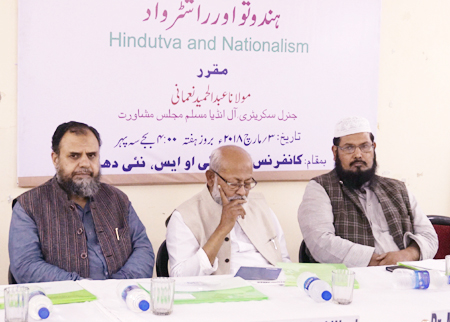
In continuation of its endeavous to engage scholars and the activists with the issues that are vital to society, the Institute of Objective Studies, held a lecture on “Hindutva and Nationalism” on March 3, 2018, at the conference hall of the Institute. Maulana Abdul Hameed Nomani, General Secretary, All India Muslim Majlis-i-Mushawarat, who delivered the lecture, observed that theory and practice assumed importance in society in the context of exclusion as it was used by some people for political purposes.
Coming to the main issue, he said that cultural legacy had three grounds on which it stood. It could be either society, community or the country. Between 1915 and 1925, Hindu Mahasabha veered round to the view that the community was the basis for nationalism. Both RSS and the Hindu Mahasabha stuck to this position which, being a narrow outlook, was treading a dangerous course, having a potential to break the country.
He remarked that the debate of Hindutva and nationalism was not new, adding that Maulana Abul Aala Mawdudi, Maulana Husain Ahmad Madni and Dr Mohammad Iqbal did not debate religion as the basis of nationalism. Debate on this aspect needed to be initiated to put a stop to the concept of narrow nationalism. Referring to the freedom in India, he said, that its scope was very wide as even the followers of Charvak, who were atheists, enjoyed the freedom to be independent of the faiths practised in India.
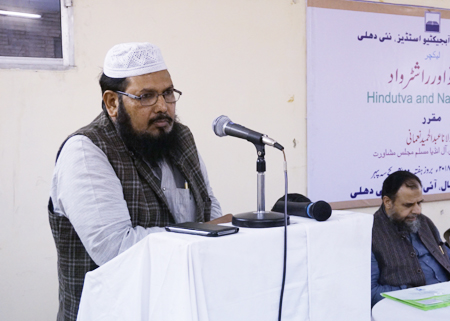
The maulana pointed out that the protagonists of Hindutva were nursing a grudge that they could not rule the country from the time of Mohammad bin Qasim and during the reign of Prithvi Raj Chauhan properly. That was the reason why they were now nurturing the ambition to rule the country. On their part Muslim religious leaders as also the Muslim institutions, particularly the seminaries, could not sense the scale of operations of the RSS. Their work became manifest from May 14, 2014 when the BJP took the reins of administration, riding the crest of popularity generated by the RSS.
Tracing the genesis of Hindu nationalism to the observations of K.N. Mukherjee, in one of his book as far back as in 1901 that after 100 years, Muslims would be in a majority, he noted that the RSS took a cue from his utterance and continued to work unceasingly to thwart it. As far as Islam was concerned, it outright rejected the idea of Hindutva model of nationalism, which identified itself with Hindus. According to Hindu nationalism, non-Hindus, like Muslims, Sikhs, Jains, Christians, Parsis, etc, fell outside the purview of nation. He maintained that the first treatise on Hindu nationalism was written by Veer Damodar Savarkar in 1920 who used the term Hindutva. The book was revised in 1927 and the name of the author was missing. Instead, it mentioned the author as a Maratha.
Referring to the Supreme Court judgment regarding Hinduism as a way of life, Maulana Nomani held that this issue was debated by Hindu stalwarts like Bankim Chandra Chattopadhyay, Aurobindo Ghosh, Lokmanya Tilak, Mahatma Gandhi and Parmanand. The judgment was silent over the question as to who would be called a Hindu. According to RSS ideologue and second chief, M S Golwalkar, Hindutva could not be explained in words. The founder of RSS, Dr. K B Hedgewar, besides Balasaheb Deoras and Prof. Rajendra Singh, also known as Rajju Bhaiyya, held the same opinion about Hindutva.
He said that Muslims were solidly behind the Congress led by Gandhi and Nehru without caring that both of them always stood for soft Hindutva. Describing the troika of Gandhi, Nehru and Dr Ambedkar as protectors of Hindutva, though the Dalit icon later on changed his discourse by pleading for the inclusion of Muslim, Christians, Sikhs, Parsis, Jains and other religions as part of the religion that was defined as a way of life, and part of the nation. He said that there were four constituents that were necessary for that way of life. These were geographical area, racial stock (blood relationship), tradition and culture. Elucidating on tradition, he said that in north India for instance, a marriage could be solemnised with the person of a higher sub-caste, whereas in the south, a maternal uncle had the first right to marry his niece (sister’s daughter). He pitched for raising the question of the way of life in respect of different religions.
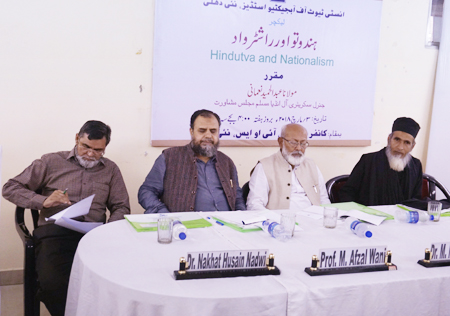
Defining qaumiat (nationalism) the maulana said that it meant concern and love for the country. When one had the concern for the country, he would be duty- bound to defend it. Commenting on Nehru’s view on the issue, he recalled the visit of the former to the Aligarh Muslim University where, addressing the students, he stated that they were Muslims, but they were part of their Indian legacy. Similarly, when Dr Ambedkar was told that Muslims were not a part of the “Indian” culture (sanskriti), he retracted his statement and expressed the view that there were many cultures in India, like Muslim, Sikh, Christian, Parsi etc. It was Brahminism that had suppressed scholastic and cultural legacy replacing it with its own theory and superfluous traditions.
The concept of equality was to give a short shrift by coining a new word samrasta (amalgamation). He said that the caste system, under which four castes were categorised, created the Hindu community which was performing God’s job. According to the Hindu view represented by the RSS and other similar organisations, nationalism was identified with cultural nationalism. In this scheme of things, country and nation were two separate entities. They treated external attack not as an attack on the nation, but attack on the country. According to this theory, Hindu nationalism was the only real entity and that alone constituted the nation. Those who joined that nationalism would form part of the nation, he added.
Maulana Nomani pointed out that language, area, religion and country were four elements that together constituted nationality, suggesting that this theory could be validated if the country was accepted as the basis of nationality. Quoting the celebrated Hindi poet, Ram Dhari Singh Dinkar, he said that India is a multi-cultural country and all religious practised here form part of that culture. He regretted that this argument was never used by Muslims. This concept of nationalism was contested by Golwalkar, who said that a Hindu was identified with nationalism as nationalism was identified with a Hindu. Golwalkar declared that those who came from outside were not part of Indian nationalism till they fully amalgamated with Hindus. Golwalkar’s plea was that India, being a holy land for Hindus, like Makkah for the Muslims, belonged to Hindus and they were the only nationalists. He said that occupation used to be the limit of the physical area but for the RSS it was a particular geographical area. Blasting this theory, he pleaded that whoever made India his home, should be treated as a nationalist.
He questioned how a person born in India would cease to be a nationalist after converting to Islam. He noted that the kalima once uttered would always remain a binding force for a Muslim. Rashtravad, or nationalism should be common to all irrespective of a religion an Indian professed. Rashtravad today was associated with Vande Mataram and Jai Shri Ram and the Assalam o Alaikum did not qualify to be a part of nationalism. This was the real issue before the Muslims which should be raised with the protagonists of Hindutva, whose nationalism was based on negative thinking. This negative thinking was described by the great Hindi novelist Munshi Prem Chand as social leprosy. He emphatically said that Muslims had every right to demand a judicious share in national resources. He reiterated that the foundation of millat was the kalmia, not nationality.
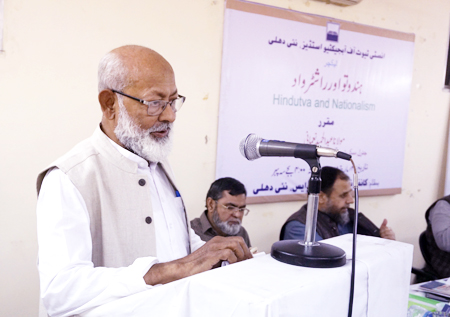
The IOS chairman, Dr. M. Manzoor Alam, who presided over the lecture, informed that two more lectures on the subject would by organised by the Institute in the near future. Cultural nationalism was being hotly debated in different circles and the maulana had spurred the audience to go deep into the issue, he said. Studying and understanding the subject was necessary in the present context because the question raised by the Sangh Parivar would have to be answered more effectively and convincingly in order to counter the propaganda unleashed by it. He warned that non-serious questions would not cut much ice with the saffron brigade stressing that the pursuit of knowledge was essential to prove equal to the task.
As many as 400 books had so far been published by the IOS but not a single student came forward to enquire about their titles or subject matter, he said. The intellectual fight had become so intense today that none could face it if ill-prepared. Calling for sophistication in the narrative, he noted that Jews and Brahmins had philosophised their viewpoints. Here lay the importance of the pursuit of knowledge, which Muslims were regrettably lacking at present.
Disagreeing with the demand for reservation for Muslims, he pitched for raising demand for share in policy-making. The future could not be built on benefit schemes for Muslims announced periodically by governments. He said that Allah had bestowed on human the power to consciously take decisions and it was their duty to use knowledge for the sake of it, but without bias.
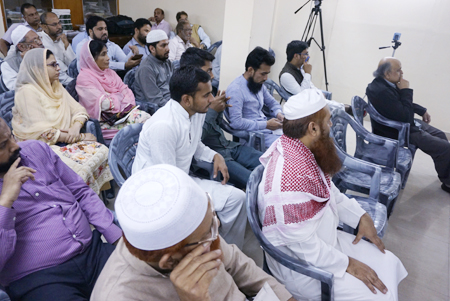
Earlier, the programme began with the recitation of a Quranic verse by Hafiz Athar Husain Nadwi, who also translated it into Urdu. Dr. Nakhat Hussain Nadwi conducted the proceedings. The lecture was attended by university teachers, researcher scholars, social activists, prominent citizens, including the Asstt. Secretary General, IOS, Prof. M. Afzal Wani.
Go Back